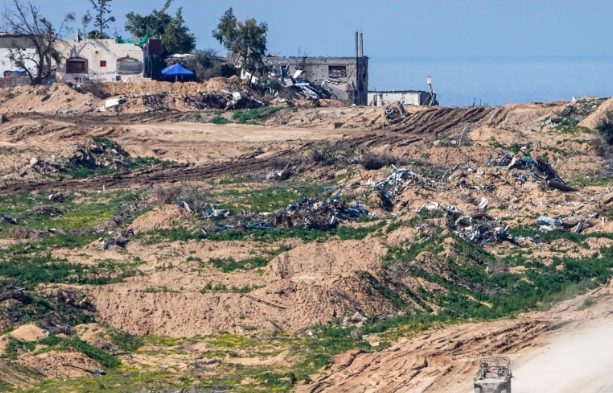
Hamas has put forward a detailed plan for a new cease-fire and hostage release deal with Israel, which will be discussed when U.S. Secretary of State Antony Blinken meets Wednesday with Israeli leaders.
Qatar’s prime minister said Tuesday that Hamas gave a “generally positive” answer to the latest plan for Gaza(opens in a new tab), but the Palestinian militant group’s response would effectively leave the militant group in power in Gaza and allow it to rebuild its military capabilities, a scenario that Israel adamantly rejects.
More than half of Gaza’s population of 2.3 million people is now crammed into the town of Rafah on the border with Egypt and surrounding areas, the United Nations Office for the Coordination of Humanitarian Affairs said Tuesday. The Palestinian death toll after nearly four months of war has reached 27,707 people, the Health Ministry in Gaza said.
A quarter of Gaza’s residents are starving and 85% of the population has been driven from their homes, with hundreds of thousands surviving in makeshift tent camps.
The Israeli military has revealed footage of an extensive tunnel network in southern Gaza that it says housed senior Hamas leaders and was used to hold at least 12 hostages at different times.
According to a map released Wednesday by the army, the multi-branched tunnel beneath the city of Khan Younis was over a kilometer (about 0.6 miles) long and had at least 16 rooms, some of which were used as cells to hold hostages with metal bars across the entrance. Soldiers also uncovered a rudimentary kitchen, bathroom, and weapons, including rocket-propelled grenades and mortars.
The tunnel was outfitted with electricity sockets, sinks, beds, and arched ceilings. Many of the rooms had decorative tiles on the walls.
Israel has said destroying the tunnels is a major objective of the ground offensive in Gaza, which has focused on Khan Younis in recent weeks. The military says its forces battled militants inside the tunnel, killing several, without providing evidence.
Several hostages freed in a cease-fire deal in November described being held inside tunnels. The military said three returned captives had been held in the tunnel beneath Khan Younis.
Hamas is believed to have built hundreds of kilometers (miles) of tunnels, which it uses to shield its fighters. Israel has uncovered several tunnels in residential areas, running beneath or near schools, hospitals and mosques.
Saudi Arabia says it won’t normalize ties with Israel without recognition of an independent Palestinian state and a full Israeli military withdrawal from Gaza.
The Foreign Ministry outlined its “firm position” in a statement released Wednesday, two days after U.S. Secretary of State Antony Blinken met with Crown Prince Mohammed bin Salman.
The Biden administration has spent much of the past year pushing for a potentially historic agreement in which Saudi Arabia would recognize Israel in return for U.S. defense guarantees, assistance in setting up a civilian nuclear program and major progress toward resolving the Israeli-Palestinian conflict.
In the latest statement, Saudi Arabia appeared to sharpen its demands.
“The Kingdom has communicated its firm position to the U.S. administration that there will be no diplomatic relations with Israel unless an independent Palestinian state is recognized on the 1967 borders with East Jerusalem as its capital, and that the Israeli aggression on the Gaza Strip stops and all Israeli occupation forces withdraw from the Gaza Strip,” the statement said.
Israel captured east Jerusalem, the West Bank and the Gaza Strip — territories the Palestinians want for their future state — in the 1967 Mideast War.
Israel annexed east Jerusalem in a move not recognized by most of the international community and views the entire city as its capital. It has built Jewish settlements across the occupied West Bank that are now home to over 500,000 Israelis. It withdrew soldiers and settlers from Gaza in 2005 but along with Egypt imposed a blockade on the territory when Hamas seized power there two years later.
Israeli Prime Minister Benjamin Netanyahu leads a government staunchly opposed to Palestinian statehood and has said Israel will maintain open-ended security control over Gaza even after the war against Hamas.
Hamas’ response to a proposed ceasefire and hostage release deal has been published in a Lebanese newspaper.
The document, whose authenticity was confirmed by officials, offers the clearest look yet at the group’s demands for the release of over 100 hostages it is holding in Gaza.
The response to a plan drawn up by the U.S., Israel, Qatar and Egypt envisions a three-phase agreement unfolding over 4 1/2 months leading to the end of the war and the release of all hostages.
Hamas’ proposal would effectively leave the militant group in power in Gaza and allow it to rebuild its military capabilities, a scenario that Israel adamantly rejects.
In the first 45-day phase, Hamas would release all remaining women and children, as well as older men and those who are ill, in exchange for the release of all the women, children, sick and older prisoners held by Israel. Israel would release an additional 1,500 Palestinian prisoners, including 500 specified by Hamas — likely high-profile militants serving life sentences.
Israel would withdraw its forces from population centers, halt aerial operations and allow in far more humanitarian aid and the start of reconstruction. It would also allow displaced people to return to their homes, including in northern Gaza, and open all crossings.
In the second phase, which would be negotiated during the first, Hamas would release the remaining hostages, mainly soldiers and civilian men, in exchange for more prisoners, and Israel would complete its withdrawal from Gaza. The two sides would exchange the remains of deceased hostages and prisoners in a third stage, which would give way to a long-term truce.
A Hamas official and two Egyptian officials confirmed the authenticity of the document published by Lebanon’s Al-Akhbar newspaper on condition of anonymity because they were not authorized to brief media on the sensitive negotiations. The newspaper is close to Lebanon’s Hezbollah militant group, an ally of Hamas.





